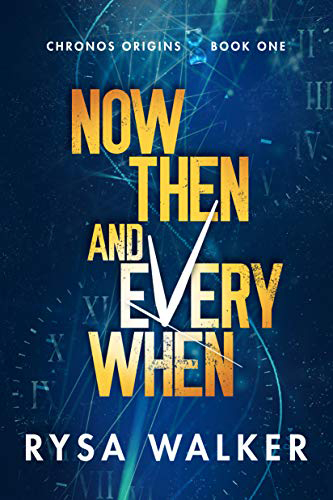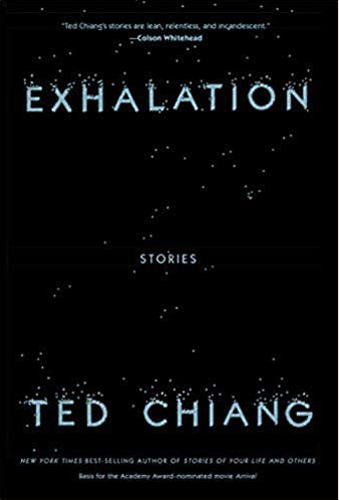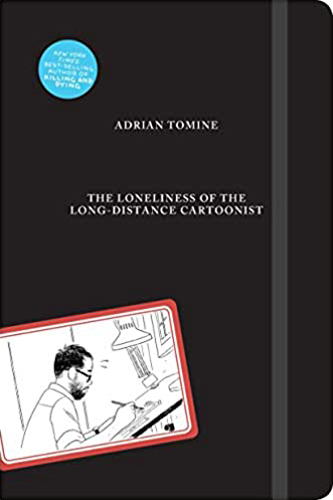What’s black and white and red all over? Today’s Stack Overflow column! Well, okay, I do have one cover that’s blue and yellow, but the rest seem to fit that description, just coincidentally. Today I’ve got a few novels and one comic book, and there’s not really a unifying theme other than me clearing out my out-box of books I’ve finished that haven’t made it into a column yet. So, let’s dive in!
More of Me by Kathryn Evans
I’ve had this young adult book on my shelf for some time but just hadn’t gotten around to reading it until this year. I’d had a note about it that it appeared to be about cloning, but then had forgotten anything else about it. As it turns out, it’s a little more complicated than that. Teva is a 16-year-old teenager with a unique problem: every year, around the time of her birthday, her body clones itself. The previous body is then stuck at that age, and the new body shares all the same memories and will age for a year. Teva’s mom doesn’t want anyone to know about her condition, so all of the previous clones are shut in the house, with only the latest one going out and attending school.
But Fifteen is not happy. Those are her friends that Teva is hanging out with; that’s her boyfriend that Teva is dating; that’s her life that Teva is now living. And it’s a lot easier keeping Six locked up at home than a determined teenager.
Okay, so the auto-cloning premise is a bit outlandish, particularly the way that it physically happens, but it makes for a fascinating story about identity and friendship. It’s like that Calvin & Hobbes storyline where Calvin attempts to clone himself in order to get more done, but each successive clone just raises more problems—though More of Me is a bit more of a serious take on it. The story also raises the question: is all of this actually happening to Teva, or is it all in her mind? And it does keep you guessing for a while, making both possibilities seem plausible as Teva struggles to be “normal” at school while struggling with all of her other selves at home.
Providence by Max Barry
Max Barry has written some of my favorite stories—he’s tackled corporate culture in Jennifer Government, augmented humanity in Machine Man, and weaponized language in Lexicon. His latest, Providence, has a somewhat different feel from the others, at least at first: it’s a sci-fi story about spaceships traveling into the far reaches of space, battling the aggressive aliens that were first encountered seven years ago. Where many of Barry’s books have had an over-the-top premise, pushing an idea to the boundaries of the absurd, Providence seems more plausible, though still with a dose of cynicism.
We follow one of the ships, Providence, as the crew prepares for its mission and then heads off. The ships are largely run by AI and there’s only a small crew. In fact, the crew is primarily there for PR purposes: they’re the ones sending videos back home, to keep Earth interested in this whole endeavor, and as such they were perhaps chosen more for their on-screen efficacy than their actual abilities to perform well in a crisis. Some of the story is about the crew wrestling with their purpose on the mission … and some of it is about them wrestling with the actual aliens, once they finally encounter them up close.
The way that the ship works reminds me a bit of the way that modern cars are getting a bit less analog and a bit more digital, the way that the technology we use (like smartphones) is almost totally opaque to the average user. It’s harder to look at something and figure out how it works; we put in some inputs and we get some outputs, and we trust that it’s correct. That’s the position the crew is in with Providence, when it starts making decisions that they don’t understand—is there something wrong with the ship? Or is it acting as programmed?
If you like the stuck-on-a-spaceship genre (like me), you’ll definitely want to put Providence on your list. While there are pieces of it that seem familiar from other sci-fi books (giant spaceships, bug-like aliens, big guns), I really liked Max Barry’s spin on the genre.
Now, Then, and Everywhen by Rysa Walker
When I started this time-travel novel, I somehow missed the “Also by Rysa Walker” page at the front of the book, and didn’t realize that she’s written several novels, novellas, short stories, and even a graphic novel, all set in the world of CHRONOS, the time-travel agency at the heart of this book. But that’s okay: Now, Then, and Everywhen is the first book in the CHRONOS Origins series, so it’s kind of meant to be a new entry point, though presumably there are connections to the previous books as well.
CHRONOS historians are trained to travel through time, with some restrictions. They’re primarily there to observe, not to interfere, and are able to place “stable points” as anchors to a specific places, allowing both travel and surveillance at that spot throughout time. In the world of CHRONOS, the timeline can be changed, though there are certain points in history that are especially crucial—if things are changed at those points, they can result in major differences. The time-travelers experience these shifts as double memories, where they remember both the history they already knew and the “new” version of history created by the shift.
Tyson Reyes (from 2304) is traveling in the 1960s, recording various moments in the civil rights movement; his friend Richard is studying rock and roll culture in the same time period. When a shift occurs, they have to work to figure out what was affected, and how to reshape history to its original path. Meanwhile, we also meet Madi Grace (from 2136) who finds a mysterious device somehow linked to her family’s past, which turns out to be a CHRONOS time-travel key. As she tinkers with it, learning how to jump through time, she also experiences the shift, and wonders if it’s connected to her own travels.
While time-jumping and its particulars are something I always enjoy dissecting, this story uses time travel to explore the civil rights movement, putting its characters into a few historic moments throughout the 1960s. Tyson is able to pass as Black or white (there are some genetics shenanigans going on in the future), and so he ends up with a foot in each world, spying on the KKK and also spending extended time in Black communities. When the shift occurs, we see some alternate history, some speculation on the way things may have played out if specific people had died earlier, or hadn’t been arrested, or didn’t attend an event.
I enjoyed the book for the most part—it was a different way to read about the civil rights movement, which is as timely a topic as ever. It also dealt with some of the murkier ethical questions involved in time travel, like who should have the power to determine which course history takes or which of many possible timelines should get to exist? The time travel itself is a bit hand-wavy, but I like what Rysa Walker does with it.
Exhalation by Ted Chiang
Ted Chiang comes up with amazing ideas. If you like sci-fi and you haven’t already, you should definitely pick up some of his stories and give them a shot. Exhalation is his latest collection of stories; I bought a copy recently when a friend told me about it. The stories vary in length—some are just a few pages long, and some are actually novella length (like “The Lifecycle of Software Objects,” which I actually had read and reviewed before when it was published as a standalone book).
I think the best way to experience this book is to just read it without knowing anything at all about it. I knew the topic of one of the stories, but that was it, and that meant that every story was a surprise. But if you need a little more of a nudge, I’ll tell you this: there’s a wonderful time travel story that explores notions of fate and regret and hope. There’s a story about quantum branching and the way we perceive our decisions based on what our other selves have done. There’s an exploration of a world that conforms to “young Earth creationism” in which scientific evidence points to the specific date of creation; that one reminded me a little of his story in Stories of Your Life and Others about the Tower of Babel, in the way that the cosmos is based on an ancient depiction of it. There’s a story about the fallibility of memory.
Reading Exhalation was a journey of discovery: with each story, I would wonder “where will he take us next?” Every destination was worth visiting.
The Loneliness of the Long-Distance Cartoonist by Adrian Tomine
I’ll wrap up with this graphic novel. I haven’t actually read much by Adrian Tomine before, though his name is familiar. This book is a collection of short autobiographical vignettes, roughly one per year from about 1995 to 2018 (though the book starts off with a prologue of sorts from 1982 when he was a kid). What they tend to have in common is Tomine’s discomfort, usually somehow related to his work as a cartoonist. They’re about his insecurities, his attempts to be taken seriously, his embarrassment at getting recognized or at not getting recognized, and so on. People mispronounce his name, confuse him for Daniel Clowes, pass him up for Neil Gaiman. He goes to events where nobody shows up, or people don’t know him, or somebody’s snoring through his entire presentation. He’s famous enough that people might recognize him, but not famous enough that he can count on it.
It’s both funny and painful to read. Tomine doesn’t paint a flattering picture of himself, but it feels relatable. I picked this one up to flip through before going to bed, and wound up reading the entire thing in one sitting: it’s like the proverbial train wreck that you just can’t peel your eyes away from. But I also liked that it covered a long span of time, because you could also see some of the major life changes Tomine experiences, including becoming a father. The last story, set in 2018, is the longest one, is a bit of a reflection on his life so far, both as an artist and as a father, spurred by a medical emergency.
The book itself is made to look like a notebook: it has the little elastic strap to hold it shut, a nice ribbon bookmark, and the paper inside is all graph paper, with Tomine’s drawings on them, as if this is his actual sketchbook. It’s a nice touch, and helps to draw you in.
My Current Stack
Well, today’s Stack Overflow catches me up on the books I’ve finished so far, which means my box of books I’ve finished but haven’t reviewed yet is now empty for the first time in a while. I’ve gotta get to reading some more! I was just looking back at my Reading Resolutions for this year, and remembered that I was hoping to read some more middle grade and YA books. I’ve also got a few sequels to work on: Noumenon Ultra by Marina J. Lostetter (coming in August) and Iron Gods by Andrew Bannister, a sequel that I’d been looking for but finally rediscovered while I was reorganizing my office.
Disclosure: I received review copies of the books in today’s column, except Exhalation, which was purchased.









